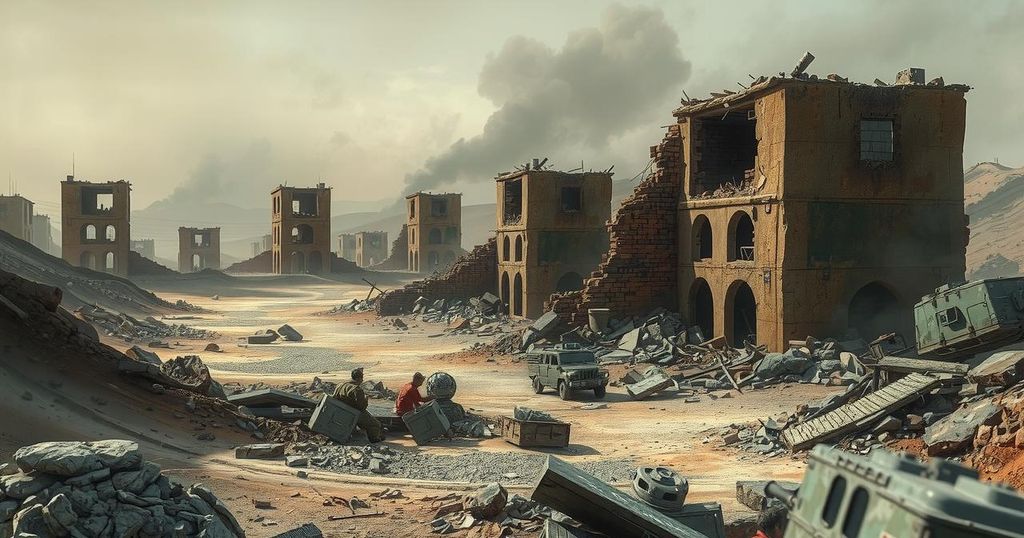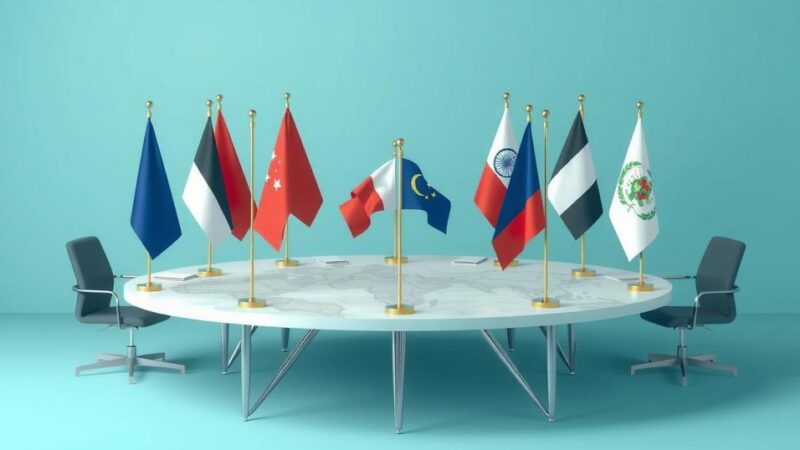Sudan’s civil conflict has severely impacted its population, with millions in need of humanitarian assistance and large-scale displacement. Following the breakdown of a civilian-military coalition, military rule has prevailed, leading to escalating violence between SAF and RSF factions. Foreign involvement has intensified the crisis, complicating efforts for humanitarian aid and political resolution, with the situation presenting grave implications for the future of democracy in Sudan.
As the civil conflict in Sudan approaches its two-year mark, millions suffer from violence and displacement. According to the UN Secretary-General, approximately 30 million individuals require urgent humanitarian assistance, while nine million have been displaced, and another three million have escaped to neighboring nations. The country, with a population of 50 million, faces unprecedented challenges due to this ongoing crisis.
The conflict in Sudan traces back to 2018-19, when mass protests led to the ousting of long-time autocrat Omar al-Bashir, paving the way for a civilian-led government. In an effort to achieve stable governance, a civilian-military Sovereignty Council was established, but this partnership was abruptly dismantled in October 2021. The army’s leadership assumed control, represented by General Abdel Fattah al-Burhan and Lt General Mohamed Hamdan Dagalo (commonly known as “Hemedti”).
The Rapid Support Forces (RSF), led by Dagalo, emerged from the notorious Janjaweed militants, infamous for their brutality during the Darfur crisis. The RSF expanded dramatically, boasting a force of 100,000 fighters by early 2023. However, plans to revive the democratic transition faltered, leaving Sudan under military rule since January 2022, with escalating tensions between the SAF and RSF setting the stage for violent conflict.
Despite diplomatic efforts by the United States and Saudi Arabia to restore the civilian-military alliance, the situation escalated dramatically when the RSF attacked military bases on April 15, 2023. The RSF captured significant territorial control, including the Darfur region and most of Khartoum by October 2023. Armed confrontations have led to widespread civilian suffering, with reports indicating approximately 150,000 fatalities and unprecedented displacement affecting 12 million people by mid-2024.
Moreover, allegations of genocide against the RSF in Darfur have surfaced, with food shortages exacerbated due to deliberate destruction of food reserves during the conflict. International humanitarian assistance remains critical, with the U.S. having allocated substantial funds for relief, though these resources are now threatened.
As the conflict progressed, the RSF began facing significant setbacks due to strategic errors and supply chain issues. In contrast, the SAF evolved by bolstering its forces and refining its strategies, leading to the recapture of major urban areas, including Khartoum, by February 2025. This counteroffensive has sadly resulted in increased civilian casualties and destruction across affected regions.
Foreign involvement has intensified the situation in Sudan. The UAE emerged as a crucial player, providing support to Dagalo and supplying arms, while also seeking to expand its geopolitical influence in the region. Conversely, the SAF has secured support from Iran and Russia, acquiring weapons and drones which facilitated territorial gains.
Despite attempts by the U.S. to re-engage Sudan post-conflict, previous efforts to normalize relations have faded. The recent imposition of sanctions against the RSF and certain leaders may not significantly impact the ongoing hostilities. The situation remains complex, as the RSF maintains control over territory while the SAF consolidates power.
In early 2025, despite military progress by the SAF, Sudan remains effectively partitioned. Both parties recognize this division, with plans for new governance structures emerging on either side. Previous aspirations for democratic governance seem elusive, as the rift between military and civilian factions deepens, creating an environment of uncertainty and ongoing strife.
In conclusion, Sudan’s civil conflict has created a severe humanitarian crisis, with millions displaced and lost lives reaching alarming figures. The collapse of the initial democratic transition has led to a grim power struggle between military factions, exacerbated by foreign interference. Both the RSF and SAF have entrenched positions, and without collective international efforts and genuine leadership, the prospects for peace and governance remain bleak in this war-torn nation.
Original Source: frontline.thehindu.com






